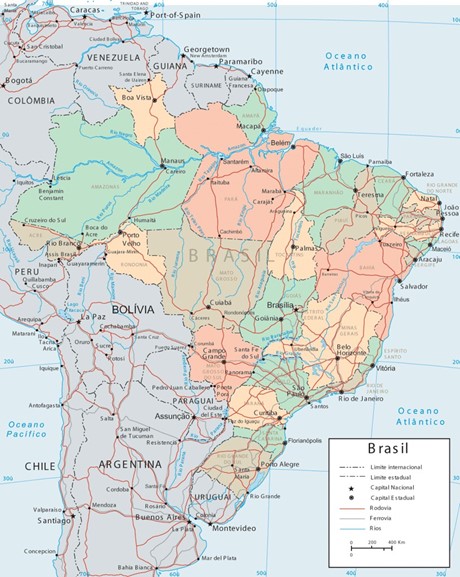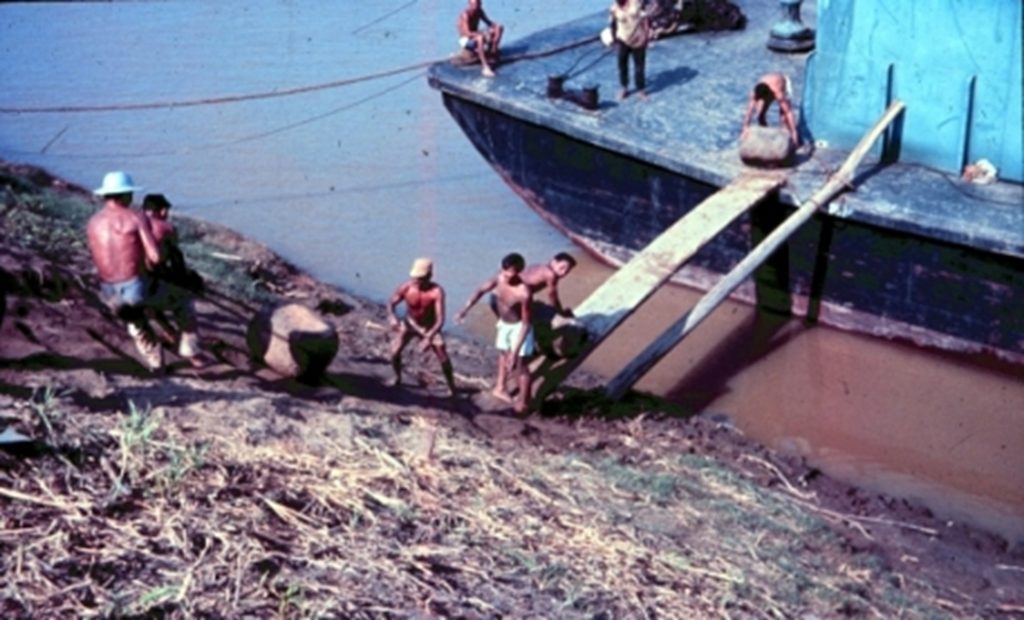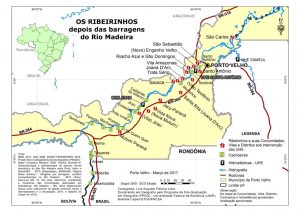24 Hell no, a’m from Texis
“Hell No, A’m frum Texis!”
I was taking a vacation from my Peace Corps assignment in Mato Grosso, Brazil, to travel around other parts of the country. I decide on a circular path traveling up in the Amazon region and then out to the Atlantic coast, then south along the coast.

Mapa do Brasil by thejourney1972 (South America addicted) license under CC BY 2.0. 1975 Arriving at the airport in Porto Velho (circled on the map) in the State of Rondônia, I checked into the only hotel in town. The multi-storied hotel took up a privileged space high on the levee overlooking the wide Madeira River. The city was constructed during the rubber boom around 1890 and was badly in need of repairs. The location of Porto Velho was critical with respect to non-navigable rapids downstream from Bolivia. It serves as a break in bulk point where the rubber is transferred from the railroad to a barge. A railway line had been built to bring rubber downstream past the rapids, where it could be reloaded onto ships going further downstream.
 A train brought rubber around the rapids of the Rio Madeira, and at Porto Velho, it is loaded on barges to be taken to Belem. Photo taken in 1966 by Rick Bein.
A train brought rubber around the rapids of the Rio Madeira, and at Porto Velho, it is loaded on barges to be taken to Belem. Photo taken in 1966 by Rick Bein.
The rubber boom had ended in the early 1900s when an Englishman brought rubber plants to other rainforest climates around the world, in Ghana, Thailand, Indonesia, Malaysia, and other tropical countries. Rubber thrived as an exotic species without the natural predators to keep it in check. Once there, the rubber trees could be densely planted in farm situations rather than scattered through forests. This was far more efficient and lucrative, and Brazil could not compete.
I took my first walking tour of the town, following the waterfront along the Rio Madeira (Madera River). I started down the main street. Passing a little bar, I heard someone speaking Portuguese with an American accent. My curiosity aroused, I stopped to see a short, chunky man of about 50 enjoying a glass of Pinga, a strong alcohol made from sugar cane. He had a holstered six-shooter on his hip! I walked up and asked him if he was American. He stared at me for what seemed to be an eternity and answered, “Hell no, a’m from Texas!”
Leo had been living in this frontier town for about 20 years and had engaged in various entrepreneurial activities. Some of them may have been legal, but mostly he followed his free-spirited approach to life, doing whatever benefited him. I’m not sure why he left Texas, but my imagination gave me some hints.
I flew out of Porto Velho a few days later, hoping to end up in Manaus in the State of Amazonas. However, the rainy season had begun, and there was a weather problem in Manaus, so we had to stop in Rio Branco, the state capital of Acre. The airline put me up for the night, and the next day I decided to look around this frontier town. I found out that there were no flights to Manaus that day, and it was suggested that I return to Porto Velho, where I could catch a scheduled plane from there to Manaus. Once back in Porto Velho, I ran into the free-spirited Leo again. His arm was in a cast suspended on a sling. I asked him what happened, and he told me he got in a gun battle up the river and had to return to the local health care facility. He was reluctant to talk about it, so I let it go.
Sidearms were common in the Brazilian frontier communities in the 1960s, like in the stories from the mid-1800s in the western United States. Most of the time, these Brazilian men would arm themselves in self-defense because of the lawlessness of the region. Also, fugitives were a constant threat as they fled the law in the more organized coastal cities and ended up in the frontier. Plus, there was the revenge factor when someone’s honor was at stake. This was true in the State of Mato Grosso, where I had been living for the last year and a half. The drama I wrote about in the “Butcher” is an example.
Much of this has not changed, some 50-some years later. Even now, there are political conflicts between cattlemen wanting to take the land belonging to native Brazilians and rainforest collectors. People are being killed, like Chico Mendez, who was a Brazilian rubber tapper, trade union leader, and environmentalist. He sought to preserve the Amazon rainforest and advocated for the human rights of Brazilian peasants and indigenous peoples. He was assassinated by a rancher on December 22, 1988. The ranchers are trying to clear the rainforest to expand their grazing lands.
There is now a movement in Brazil to protect the rights of the people of the rain forest who conservatively manage the resources, harvesting what they need for food and shelter, as well as tapping rubber trees. These people are mostly indigenous mixed with Nordestino Brazilians and descendants of their slaves who, in the mid-1880s, joined them in that lifestyle. The major threat to their existence is deforestation by large agrarian enterprises.
The current president of Brazil is being supported by large cattle corporations. There is great concern because he has no interest in protecting this most precious rain forest, let alone the people of the forest. How this will play out remains to be seen.

Back to Leo with his bandaged arm, he wouldn’t give me any details. I wanted to ask what happened to the other guy.
I noticed his hat had a hole in the front and a smaller one on the back right side, which seemed like bullet holes! The small one where the bullet entered, leaving a larger hole where it exited. That would make sense if he were running away. So I asked him, “What happened to your hat?”
 “You can have it!” he replied as he shoved the hat across the bar.
“You can have it!” he replied as he shoved the hat across the bar.
I thanked him, but wanted to know “how the holes got there!”
His response was, “You should have seen the other guy!”
I still have this hat.

